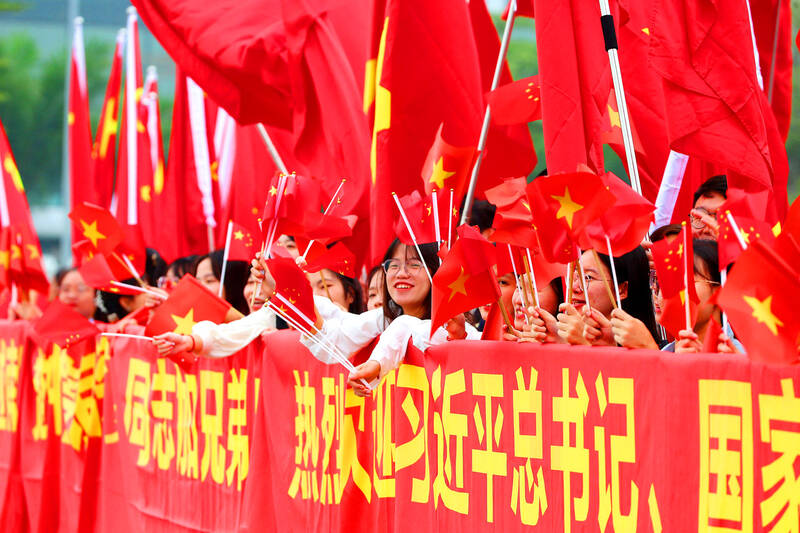Chinese President Xi Jinping (習近平) yesterday arrived in Vietnam seeking to further deepen ties with the Southeast Asian nation, weeks after it elevated its diplomatic relations with Western-aligned countries.
In his first visit since 2017, Xi was to meet with Vietnamese Communist Party General Secretary Nguyen Phu Trong, President Vo Van Thuong and Prime Minister Pham Minh Chinh, the Vietnamese Ministry of Foreign Affairs said.
“This reflects Beijing’s concerns about Hanoi’s advances with the West,” said Nguyen Khac Giang, a visiting fellow with the ISEAS-Yusof Ishak Institute in Singapore. “Concerns that Vietnam may join an anti-China alliance and gang up against China.”

Photo: AFP
The Chinese leader received a red carpet welcome as Chinh greeted him on the tarmac. Dozens of Chinese and Vietnamese nationals gathered at the airport, waving Chinese and Vietnamese flags to welcome Xi and his wife, Peng Liyuan (彭麗媛), who accompanied him on the visit.
Xi’s visit marks 15 years of China being a “comprehensive strategic partner” of Vietnam, the highest official designation for a diplomatic relationship.
Vietnam plays an increasingly important strategic role in security and the economy in Southeast Asia.
Ideologically, Vietnam is closer to Beijing; it is run by a Communist Party with strong ties to China. However, in recent months, Vietnam has signaled closer ties with Western countries.
In September, US President Joe Biden visited Vietnam to mark the US being elevated to the same diplomatic status as China. Biden said that the stronger ties were not about countering China, though US diplomacy across Asia and the Pacific has been focused on improving defense ties with countries to do just that.
Last month, Japan and Vietnam boosted their economic and security ties, citing a “free and open Indo-Pacific,” with Japan being given the same diplomatic status as China and the US. Japan has been rapidly developing closer ties with Vietnam and is its third-largest foreign investor.
Experts say Vietnam is hedging against its large neighbor and its geographical claims.
“You can see that they’re flexible and balancing big powers,” said Nguyen Thanh Trung, a professor of Vietnamese studies at Fulbright University Vietnam.
Vietnam is one of several countries to clash with China in the disputed South China Sea, particularly on two archipelagos, the Spratlys (Nansha Islands, 南沙群島) and the Paracel Islands (Xisha Islands, 西沙群島).
It has faced off with China’s coast guard in the past in the disputed waters. Vietnam usually does not publicize the confrontations.
In October, the Chinese president told his Vietnamese counterpart that amid “changing international landscapes” the two nations should continue to develop their “traditional friendship.”
The two spoke after attending China’s Belt and Road Forum. Vietnam is likely to sign some infrastructure agreements with Beijing, as it has paid close attention to the development of the Chinese-built high-speed rail in Laos, completed in 2021.
“The Vietnamese prime minister wants to focus on more infrastructure,” Nguyen said. “He thinks it’s key to economic growth.”

The Burmese junta has said that detained former leader Aung San Suu Kyi is “in good health,” a day after her son said he has received little information about the 80-year-old’s condition and fears she could die without him knowing. In an interview in Tokyo earlier this week, Kim Aris said he had not heard from his mother in years and believes she is being held incommunicado in the capital, Naypyidaw. Aung San Suu Kyi, a Nobel Peace Prize laureate, was detained after a 2021 military coup that ousted her elected civilian government and sparked a civil war. She is serving a

REVENGE: Trump said he had the support of the Syrian government for the strikes, which took place in response to an Islamic State attack on US soldiers last week The US launched large-scale airstrikes on more than 70 targets across Syria, the Pentagon said on Friday, fulfilling US President Donald Trump’s vow to strike back after the killing of two US soldiers. “This is not the beginning of a war — it is a declaration of vengeance,” US Secretary of Defense Pete Hegseth wrote on social media. “Today, we hunted and we killed our enemies. Lots of them. And we will continue.” The US Central Command said that fighter jets, attack helicopters and artillery targeted ISIS infrastructure and weapon sites. “All terrorists who are evil enough to attack Americans are hereby warned

Seven wild Asiatic elephants were killed and a calf was injured when a high-speed passenger train collided with a herd crossing the tracks in India’s northeastern state of Assam early yesterday, local authorities said. The train driver spotted the herd of about 100 elephants and used the emergency brakes, but the train still hit some of the animals, Indian Railways spokesman Kapinjal Kishore Sharma told reporters. Five train coaches and the engine derailed following the impact, but there were no human casualties, Sharma said. Veterinarians carried out autopsies on the dead elephants, which were to be buried later in the day. The accident site

‘NO AMNESTY’: Tens of thousands of people joined the rally against a bill that would slash the former president’s prison term; President Lula has said he would veto the bill Tens of thousands of Brazilians on Sunday demonstrated against a bill that advanced in Congress this week that would reduce the time former president Jair Bolsonaro spends behind bars following his sentence of more than 27 years for attempting a coup. Protests took place in the capital, Brasilia, and in other major cities across the nation, including Sao Paulo, Florianopolis, Salvador and Recife. On Copacabana’s boardwalk in Rio de Janeiro, crowds composed of left-wing voters chanted “No amnesty” and “Out with Hugo Motta,” a reference to the speaker of the lower house, which approved the bill on Wednesday last week. It is